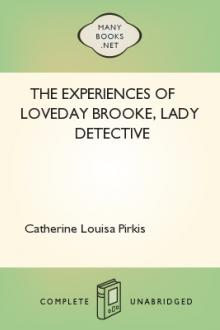The Experiences of Loveday Brooke, Lady Detective - Catherine Louisa Pirkis (read aloud books .TXT) 📗

- Author: Catherine Louisa Pirkis
- Performer: -
Book online «The Experiences of Loveday Brooke, Lady Detective - Catherine Louisa Pirkis (read aloud books .TXT) 📗». Author Catherine Louisa Pirkis
“Miss Brooke, another question or two. Can you in any way account for the sudden payment of Mrs. Turner’s debts—a circumstance that led me a little astray in the first instance?”
“Mrs. Brown explained the matter easily enough. She said that a day or two back, when she was walking on the other side of the vicarage hedge, and the husband and wife in the garden were squabbling as usual over money-matters, she heard Mr. Turner say indignantly, ‘only a week or two ago I gave you nearly £500 to pay your debts in Brighton, and now there comes another bill.’”
“Ah, that makes it plain enough. One more question and I have done. I have no doubt there’s something in your theory of the hypnotic power (unconsciously exercised) of such men as Richard Steele, although, at the same time, it seems to me a trifle far-fetched and fanciful. But even admitting it, I don’t see how you account for the girl, Martha Watts, seeing the ghost. She was not present at the prayer-meeting which called the ghost into being, nor does she appear in any way to have come into contact with the Rev. Richard Steele.”
“Don’t you think that ghost-seeing is quite as catching as scarlet-fever or measles?” answered Loveday, with a little smile. “Let one member of a family see a much individualized and easily described ghost, such as the one these good people saw, and ten to one others in the same house will see it before the week is over. We are all in the habit of asserting that ‘seeing is believing.’ Don’t you think the converse of the saying is true also, and that ‘believing is seeing?’
VII. MISSING!
“NOW, Miss Brooke, if this doesn’t inspire you I don’t know what will,” said Mr. Dyer. And, taking up a handbill that lay upon his writing-table, he read aloud as follows:
“Five hundred pounds reward.—Missing, since Monday, September 20th, Irené, only daughter of Richard Golding, of Langford Hall, Langford Cross, Leicestershire. Age 18, height five feet seven; dark hair and eyes, olive complexion, small features; was dressed when she left home in dark blue serge walking costume, with white straw sailor hat trimmed with cream ribbon. Jewellery worn; plain gold brooch, leather strap bracelet holding small watch, and on the third finger of left hand a marquise ring consisting of one large diamond, surrounded with twelve rubies. Was last seen about ten o’clock on the morning of the 20th leaving Langford Hall Park for the high road leading to Langford Cross. The above reward will be paid to any one giving such information as will lead to the young lady’s restoration to her home; or portions of the reward, according to the value of the information received. All communications to be addressed to the Chief Inspector, Police Station, Langford Cross.”
“Was last seen on the 20th of September!” exclaimed Loveday, as Mr. Dyer finished reading. “Why, that is ten days ago! Do you mean to say that reward has not stimulated the energies of the local police and long ago put them on the traces of the missing girl?”
“It has stimulated their energies, not a doubt, for the local papers teem with accounts of the way in which the whole country about Langford has been turned upside down generally. Every river, far and near has been dragged; every wood scoured; every railway official at every station for miles round has been driven nearly mad with persistent cross-questioning. But all to no purpose. The affair remains as great a mystery as ever. The girl, as the handbill says, was seen leaving the Park for the high road by some children who chanced to be passing, but after that she seems to have disappeared as completely as if the earth had opened to receive her.”
“Cannot her own people suggest any possible motive for her thus suddenly leaving home?”
“It appears not; they seem absolutely incapable of assigning any reason whatever for her extraordinary conduct. This morning I received a letter from Inspector Ramsay, asking me to get you to take up the case. Mr. Golding will not have the slightest objection to your staying at the Hall and thoroughly investigating the matter. Ramsay says it is just possible that they have concentrated too much attention on the search outside the house, and that a promising field for investigation may lie within.”
“They should have thought of that before,” said Loveday sharply. “I hope you declined the case. Here’s the country inspector to the backbone! He’ll keep a case in his own hands so long as there’s a chance of success; then, when it becomes practically hopeless, hand it over to you just to keep his own failure in countenance by yours.”
“Ye-es,” said Mr. Dyer, slowly. “I suppose that’s about it. But still, business has been slack of late—expenses are heavy—if you thought there was a ghost of a chance—”
“After ten days!” interrupted Miss Brooke, “when the house has settled down into routine, and every one has his story cut and dried, and all sorts of small details have been falsified or smudged over! Criminal cases are like fevers; they should be taken in hand within twenty-four hours.”
“Yes, I know,” said Mr. Dyer irritably, “but still, as I said before, business is slack—”
“Oh, well, if I’m to go, I’m to go, and there’s an end of it,” said Loveday resignedly. “I only say it would have been better, for the credit of the office, if you had declined such a hopeless affair. Tell me a little about this Mr. Richard Golding, who and what he is.”
Mr. Dyer’s temper grew serene again.
“He is a very wealthy man,” he answered, “an Australian merchant; came over to England about a dozen years ago, and settled down at Langford Hall. He had, however, been living in Italy for some six or seven years previously. On his way home from Australia he did Italy, as so many Australians do, fell in love with a pretty girl, whom he met at Naples, and married her, and by her had this one child, Irené, who is causing such a sensation at the present moment.”
“Is this Italian wife living?”
“No, she died just before Mr. Golding came to England. He has not yet married again, but I hear is on the point of so doing. The lady he contemplates making the second Mrs. Golding is a certain Mrs. Greenhow, a widow, who for the past year or so has acted as chaperon to his daughter and housekeeper to himself.”
“It is possible that Miss Irené was not too well pleased at the idea of having a stepmother.”
“Such is the fact. From all accounts she and her future stepmother did not get on at all well together. Miss Irené has a very hasty, imperious temper, and Mrs. Greenhow seems to have been quite incapable of holding her own with her. She was to have left the hall this month to make her preparations for the approaching wedding; the young lady’s disappearance, however, has naturally brought matters to a standstill.”
“Did Miss Golding take any money away with her, do you know?”
“Ah, nobody seems sure on that head. Mr. Golding gave her a liberal allowance and exacted no accounts. Sometimes she had her purse full at the end of the quarter, sometimes it was empty before her quarterly cheque had been cashed a week. I fear you will have to do without exact information on that most important point.
“She had lovers, of course?”
“Yes; in spite of her quick temper she seems to have been a lovable and most attractive young woman, with her half-Australian half-Italian parentage, and to have turned the heads of all the men in the neighbourhood. Only two, however, appear to have found the slightest favour in her eyes—a certain Lord Guilleroy, who owns nearly all the land for miles round Langford, and a young fellow called Gordon Cleeve, the only son of Sir Gordon Cleeve, a wealthy baronet. The girl seems to have coquetted pretty equally with these two; then suddenly, for some reason or other, she gives Mr. Cleeve to understand that his attentions are distasteful to her, and gives unequivocal encouragement to Lord Guilleroy. Gordon Cleeve does not sit down quietly under this treatment. He threatens to shoot first his rival, then himself, then Miss Golding; finally, does none of these three things, but starts off on a three years’ journey round the world.”
“Threatens to shoot her; starts off on a journey round the world,” summed up Loveday. “Do you know the date of the day on which he left Langford?”
“Yes, it was on the 19th; the day before Miss Golding disappeared. But Ramsay has already traced him down to Brindisi; ascertained that he went on board the Buckingham, en route for Alexandria, and has beaten out the theory that he can, by any possibility, be connected with the affair. So I wouldn’t advise you to look in that quarter for your clue.”
“I am not at all sanguine about finding a clue in any quarter,” said Loveday, as she rose to take leave.
She did not feel in the best of tempers, and was a little disposed to resent having a case, so to speak, forced upon her under such disadvantageous conditions.
Her last words to Mr. Dyer were almost the first she addressed to Inspector Ramsay when, towards the close of the day, she was met by him at Langford Cross Station. Ramsay was a lanky, bony Scotchman, sandy-haired and slow of speech.
“Our hopes centre on you; we trust you’ll not disappoint us,” he said, by way of a greeting.
His use of the plural number made Loveday turn in the direction of a tall, good-looking man, with a remarkably frank expression of countenance, who stood at the inspector’s elbow.
“I am Lord Guilleroy,” said this gentleman, coming forward. “Will you allow me to drive you to Langford Hall? My cab is waiting outside.”
“Thank you; one moment,” answered Loveday, again turning to Ramsay. “Now, do you wish,” she said, addressing him, “to tell me anything beyond the facts you have already communicated to Mr. Dyer?”
“No-o,” answered the inspector, slowly and sententiously. “I would rather not bias your mind in any direction by any theory of mine.” (“It would be rather a waste of time to attempt such a thing,” thought Loveday.) “The only additional fact I have to mention is one you would see for yourself so soon as you arrived at the Hall, namely, that Mr. Golding is keeping up with great difficulty—in fact, is on the verge of a break-down. He has not had half an hour’s sleep since his daughter left home,—a serious thing that for a man at his age.”
Loveday was favourably impressed with Lord Guilleroy. He gave her the idea of being a man of strong common-sense and great energy. His conversation was marked by a certain reserve. Although, however, he evidently declined to wear his heart upon his sleeve, it was easy to see, from a few words that escaped him, that if the search for Miss Golding proved fruitless his whole life would be wrecked.
He did not share Inspector Ramsay’s wish not to bias Loveday’s mind by any theory of





Comments (0)